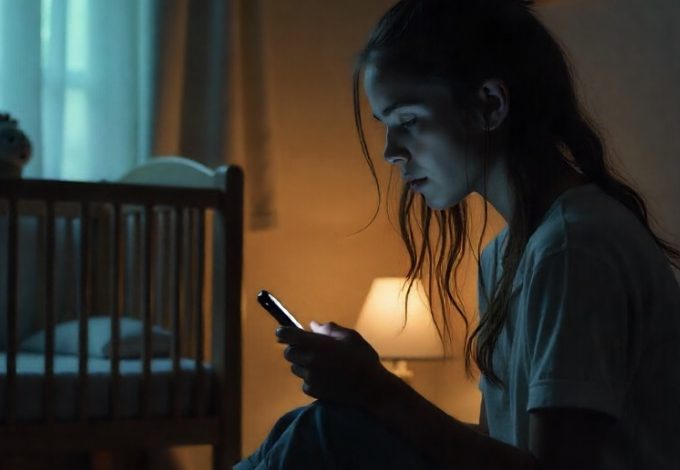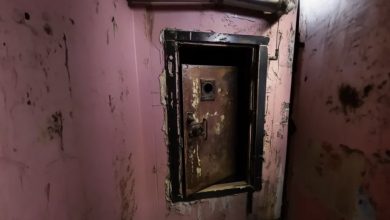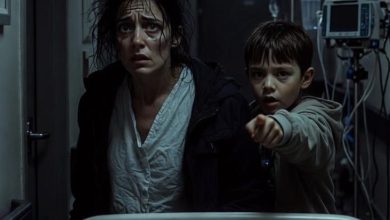She noticed the baby’s bruises growing darker each day and what she found on camera changed everything

The nanny kept spotting odd marks whenever she changed the baby’s diaper. One day she hid small cameras in the nursery — and what the recordings showed made her shake.
Emily was twenty-five, quiet and steady, the kind of person who listens first and speaks later. Since eighteen, her life had been shaped by caring for other people’s kids — feeding them, rocking them, singing them to sleep. Families hired her because she was gentle and observant. She always put the child first. But rich employers often mistook her kindness for weakness. They pushed extra chores on her, spoke down to her, and expected her to accept it. Afraid to lose work, Emily learned to swallow the daily slights and keep her face calm.
For eight months she had worked for the Torres family in their cold, ultra-modern house, where even the air felt unfriendly. Elena and Ricardo had a ten-month-old son, Lucas. They treated Emily as if she were invisible. Elena, especially, could be cruel in small ways — a comment about Emily’s clothes, a jab about her pace. Ricardo, glued to his phone, let it happen. Emily stayed for one reason: Lucas. His little laugh and trusting eyes reminded her why she did this work. I’m here for him, she told herself whenever a harsh word stung.
One afternoon, a rare warm moment filled the living room. Emily sat on the floor, shaking a rattle while Lucas crawled toward her, giggling.
“Come on, Lucas! You’ve got it!” she cheered.
His laughter made the big, empty room feel alive — until Elena’s heels clicked across the marble.
“Emily,” Elena said, voice dripping with disapproval, “try to look like a professional. Those jeans and that old shirt? Why should I trust you with my child when you look like you just came from a garden?”
Heat climbed up Emily’s neck. “I’m sorry, Mrs. Torres. I’ll do better,” she said, eyes lowered. Arguing would only make things worse.
Elena left muttering about efficiency. Emily breathed out and smiled at Lucas again, determined not to let the moment be ruined.
Soon Elena returned with Lucas in her arms and opened a high cabinet. “Where’s his medicine? Emily, if you moved things again—”
A heavy thud stopped her. Lucas burst into painful cries. Emily jumped up.
“What was that? Is he okay?” she said, rushing over.
A red patch had already formed on Lucas’s forehead. In a heartbeat, Emily understood: while searching the cabinet, Elena had held Lucas too close, and his head hit the sharp door edge.
“Oh my God, Mrs. Torres, what happened?” Emily asked, reaching out — but Elena shoved her hand away.
“It was you!” Elena snapped, her fear flipping into blame. “How could you be so careless? I trusted you!”
Emily stared at her, stunned. “Mrs. Torres, I was across the room with his toys. I didn’t touch him,” she said, voice shaking.
Elena had made up her mind. “Don’t give me excuses! I knew this would happen. You’re not careful.”
Lucas’s crying only made the room tighter with tension. Emily ached to comfort him, but Elena held the child away like a shield.
Ricardo came home to the noise. “What’s going on?” he asked.
Elena pointed at Emily. “Her fault. She left him where he could get hurt. He hit his head.”
“That’s not true, Mr. Torres,” Emily said, desperate. “It was an accident, but I wasn’t near him.”
Ricardo raised a hand for silence. He looked at Lucas’s forehead, then at Elena’s watery eyes. “Elena, you’re sure?”
“I’m sure,” she said, not meeting Emily’s gaze.
Emily tried one last time. “I would never harm Lucas. Please believe me.”
Ricardo’s face hardened. “You’ve been helpful, Emily, but we can’t risk it. We have to end the contract.”
The words hit like a punch. “Please, Mr. Torres. I need this job. Lucas needs me.”
“That’s enough,” Elena said coldly. “Pack your things.”
Emily gathered her few items with shaking hands. At the door she stopped. “You’re making a mistake. I love Lucas. I’d never hurt him.”
No one answered. The door closed. Emily walked down the street feeling hollow, but under the emptiness, a small flame of resolve flickered. You can take the job, she thought, wiping tears away, but you won’t take my self-respect. I’ll prove who I am.
Days later, she stood at another big white house. The ad said a nanny for a nine-month-old. She needed the work. Don’t overthink it, she told herself, and rang.
A middle-aged man opened. “You’re the new nanny. Come in,” he said. His smile didn’t reach his eyes. This was Gustavo.
Inside was fancy but cold: gold accents, dark wood, no warmth.
“Let me be direct,” Gustavo said. “Besides caring for the baby, you’ll handle cleaning, dishes — whatever needs doing. You’re here all day, so it’s efficient.”
“The ad said only child care,” Emily answered. “I’m not a housekeeper.”
He laughed. “Here everyone helps. If you don’t like it, others will.”
Her stomach tightened. Rent was due. “I’ll prioritize the baby,” she said.
“Great. You start tomorrow. You’ll sleep in the back room.”
The “room” was a tiny, damp cell with a barred window and a thin mattress. Mold scented the air.
“This is your space,” Gustavo said. “Simple, but fine.”
Emily swallowed her pride. Then he introduced baby Pedro. The moment she held him, the familiar calm returned. We’ll be okay, she whispered.
The first days were grueling. Gustavo made her clean the entire house before she could tend Pedro, then scolded her for not spending enough time soothing him. “If you cleaned faster, the baby wouldn’t cry,” he said, irony sharpening every word.
One night she found her mattress buried under dirty laundry.
“Mr. Gustavo, why is my bed covered in clothes?” she asked.
“We needed a surface,” he said. “Sleep on the floor. You’ll live.”
“This is humiliating,” Emily whispered.
“You’re here to work, not complain. There’s the door,” he said, certain she’d stay.
That night she lay on the cold floor, tears soaking into the dust. I deserve better, she thought.
Morning cries woke her. She chose herself. After Pedro’s nap, she faced Gustavo.
“I came expecting respect. This is exploitation. I quit.”
“You’re quitting? After what I’ve given you?” he scoffed. “Where will you find a job with a free room?”
“A free room isn’t a cell,” she said. “Good luck finding someone else to accept this.”
She walked out lighter than she’d felt in weeks. The future was unknown, but she was free.
Soon she interviewed with a widow named Camila Montero, who needed a nanny for her little girl. Camila seemed kind, the house warm and inviting. “My daughter, Judi, is asleep,” Camila said. “You two will do well together.”
The first days were peaceful but strange. Emily helped around the house, cooked, and waited to meet Judi. Somehow, Judi was always “sleeping.” At night, Emily heard laughter from the girl’s room — a high, repetitive sound that didn’t quite seem real.
The next morning, Camila finally “introduced” them. Sitting on Camila’s lap was a life-sized rag doll in a pink dress, ribbons in its yarn hair.
“Emily, this is my Judi,” Camila said sweetly, stroking the doll’s fabric face.
Emily’s heart pounded. “She’s… very pretty,” she said carefully.
From then on, Camila had Emily set plates for the doll and read bedtime stories while Camila nodded as if the toy were listening. Emily played along, uneasy growing by the day.
While cleaning, Emily found a photo album: Camila with a real child — a joyful little girl. The pictures stopped abruptly.
“What are you doing with that?” Camila barked, eyes wild.
“I was just tidying. I’m sorry,” Emily said, startled.
Clutching the album, Camila whispered, “Judi is everything. I won’t let anyone take her away again.”
The grief in her voice told the real story: Camila had lost her child and replaced her with a doll to survive the pain. Emily felt compassion — and concern. She called authorities and asked for a wellness check.
When a mental health team arrived, Camila looked at Emily, wounded. “You did this.”
“You deserve help,” Emily said softly.
Camila agreed to an evaluation and left. Emily packed her bag in silence and moved on, heart heavy.
Weeks blurred together. Emily sat in her small kitchen with a piece of stale bread and a glass of water. Bills piled up. Food ran out. She cut the bread into tiny pieces to trick her stomach. She thought of the children she’d cared for and clung to the fact that she was good at this. I am good at this, she told herself. She fell asleep under thin blankets, afraid of losing her place to live.
At sunrise, her phone buzzed. She flinched, expecting a bill collector.
“Hello?” she whispered.
“Hi, is this Emily? I’m Jude,” a calm voice said. “I need a nanny for my daughter.”
Hope surged. “Yes, this is Emily. I’m available.”
“My baby, Charlotte, is five months old,” Jude said. “I’ve heard good things about you. Can we meet today?”
They set a time. Emily put on her best white shirt and black pants. She looked tired in the mirror, but her eyes held a small spark. Maybe this is the fresh start, she thought.
Jude lived in a bright, modern home full of light. She opened the door with a warm smile. “Emily, thank you for coming.”
Inside was tasteful and calm. “Charlotte is my whole world,” Jude said. “I need someone kind and patient. My schedule takes me out often, but I want her surrounded by love.”
Emily’s old doubts flickered — too good to be true — but when she met Charlotte asleep in a white crib, the doubts softened. “She’s beautiful,” Emily said, smiling for the first time in weeks.
Jude placed the baby in Emily’s arms after she woke. Charlotte blinked up at her and cooed. “She seems to like you,” Jude said. “She’s sensitive to people.”
The morning went smoothly. Jude stayed out of the way, respectful and kind. Before leaving for work the next day, she told Emily, “Feel at home. The kitchen is yours. Call me if you need anything.”
For the first time in a long time, Emily felt true hope.
The next morning, after Jude left, Emily followed her usual routine. Charlotte was content, babbling. When Emily went to change her diaper, her smile faded. A dark purple bruise marked the baby’s thigh, edges smudged and unclear.
What is this? Emily whispered. She touched the area gently; Charlotte didn’t flinch. The location seemed odd for a crib bump.
She smoothed bruise cream over the mark and looked around. In the crib corner, she noticed tiny sharp wood splinters. That shouldn’t be there, she thought, frowning. She tucked the splinters in a tissue. Should she tell Jude? Jude had been nothing but good to her. And Emily couldn’t risk another job ending. Still, the thought nagged at her all day.
The next morning, new marks had appeared — darker on the thigh, smaller ones on Charlotte’s arm. Emily’s hands shook. This wasn’t random. Someone was hurting this baby.
Her mind rejected the idea that Jude could be responsible. But the bruises were real. Emily called the only doctor she trusted, Dr. Andrew.
“Doctor, it’s Emily. I take care of a baby who has strange bruises. Can you look at her?”
He agreed. After Jude left for work, he arrived, gentle and thorough. He studied the marks and sighed.
“Emily, these are not typical accident bruises,” he said quietly. “They look like pressure from hands. You must protect this child. Document everything — photos, notes. If needed, you’ll need evidence.”
His words landed like ice. “Who would do that to a baby?” Emily asked, shaken.
“I can’t say,” he answered. “But act quickly.”
Later, Emily searched the nursery more carefully. She found a small box tucked in a cabinet — filled with loose, rusty nails. Fear curled in her gut. Nails. Splinters. Bruises. The pieces were there, but the picture wasn’t clear. She didn’t sleep that night.
The next day, after Jude left, Emily made a decision. She used her last emergency cash to buy a tiny hidden camera. She set it high in the nursery, tucked behind baby books, with a clear view of the crib. She linked it to an app on her phone. Please let me be wrong, she prayed.
All afternoon she forced normal routines, though dread pressed on her chest. When Jude came home, she smiled as usual.
“I’m exhausted,” Jude sighed. “I’ll take Charlotte to my room. Good night, Emily.”
As always, Jude went in and locked the door. The click sounded different now — like a warning.
Emily opened the app. At first, everything looked sweet. Jude rocked Charlotte and whispered to her. She laid the baby in the crib and sat nearby, watching. Emily felt some relief. Maybe I’m imagining things.
Minutes passed. Jude began pacing. Then she knelt near the corner. Emily switched to the second angle.
Jude had a hammer in her hand.
A faint, steady sound came through the phone: thud. Thud. Thud. Methodical. Emily leaned closer, heart pounding.
Jude was knocking boards together on the floor, measuring, hammering, fitting edges. Emily rewound and watched again. With each strike, a shape formed.
A long wooden box.
No. No. This can’t be. She sped the footage. Jude’s movements were focused, exact, almost calm. She lined the inside with a folded white cloth.
It was the size of a baby.
Emily clapped a hand over her mouth, tears bursting to her eyes. Panic flooded her. She turned off the phone and moved.
She tiptoed to the nursery. Charlotte slept peacefully. “I’m getting you out,” Emily whispered, lifting her. She packed diapers, a bottle, tiny clothes, tucking them in a bag with shaking hands. At the front door, she hesitated. Running off with a baby could backfire. If Jude woke up, she could call the police and accuse Emily of kidnapping. Emily needed a safer plan.
She called Dr. Andrew. “Doctor, I saw Jude building a coffin-sized box. I have video. I need to protect Charlotte.”
“Don’t run aimlessly,” he said firmly. “Take Charlotte to the hospital now. They’ll examine her, document the injuries, and contact authorities. That keeps you safe and the baby protected.”
He was right. Emily bundled Charlotte and left into the cold pre-dawn. The bus ride took forever.
At the hospital, the staff moved quickly. After tests and exams, a doctor spoke to Emily.
“Emily, Charlotte is stable. The bruising has a medical explanation,” he said.
Emily blinked. “What do you mean?”
“Charlotte has idiopathic thrombocytopenic purpura,” he explained gently. “It makes her bruise very easily. There’s no sign of abuse.”
Relief hit, followed by guilt. She had been wrong about the marks — but not about the danger. The diagnosis didn’t explain the box.
She left Charlotte in safe hands and hurried back to Jude’s house with the footage on a USB drive. Inside, the wooden box was gone. She searched closets, the garage, the nursery — nothing.
The front door opened. Jude stood there, fury carved into her face. “Emily. Where is my daughter?”
“She’s safe at the hospital,” Emily said steadily. “We need to talk.” She held up the drive. “I know what you were building.”
Jude’s rage exploded. She slapped Emily and tore her bag open, ripping the printed stills to shreds. “You will not destroy me!”
“Then explain,” Emily cried. “Why the box?”
Jude froze, then sagged. She sank to the couch, face in her hands. When she looked up, her eyes were empty.
“You want the truth?” she said hoarsely. “I never wanted a child like this. Sick. Fragile. A lifetime of burden. The box was for after. Poison in her milk. Quick. I would bury her and finally be free.”
Emily reeled, stomach dropping. At that moment, the door burst open. Two officers rushed in.
“Jude Smith, you’re under arrest for attempted murder,” one said.
Dr. Andrew stood behind them. “I called the police after you left the hospital,” he told Emily. “I couldn’t let you face this alone.”
The trial was swift. The footage and Jude’s words to Emily left no doubt. Seeing Jude in court — thin, defeated — Emily felt no triumph, only grief for the baby who had been failed by her own mother.
The judge’s voice was stern. “You are found guilty. Your calculated intent to take your child’s life shows a grave disregard for human life. You are sentenced to life in prison without parole.”
When the gavel fell, Emily finally breathed. Charlotte was safe.
In the weeks that followed, Charlotte flourished under careful medical care. With Jude in prison, the state took custody. One afternoon, Dr. Andrew approached Emily at the crib.
“Have you considered adopting her?” he asked softly. “You already gave her what matters most — protection and love. You’d be a wonderful mother.”
The idea scared Emily — money, paperwork, responsibility — but when Charlotte wrapped tiny fingers around her hand, Emily knew the answer. Her heart had decided already.
The adoption was long and tiring, but Emily showed up to every step. One bright morning, a judge smiled. It was official.
Emily held Charlotte close, tears warm on her cheeks. “You’re my daughter,” she whispered.
Life settled into a new rhythm. Their small home filled with laughter. Charlotte’s condition was managed carefully, and she grew strong and joyful. Emily discovered a deeper strength in herself — and a love that felt limitless.
Years later, on Charlotte’s fifth birthday, they sat in their little garden. Emily handed her a photo book, page after page of their journey — doctor visits, first steps, bedtime stories, park picnics, messy art days.
On the first page, Emily had written: “You brought color back into my life and taught me what love truly is. With you, I am whole.”
As Charlotte turned the pages, grinning, Emily knew that everything they had endured had led here — to a family forged not by blood, but by fierce, unwavering love. And that was the only thing that truly mattered.










